




By Ryan Claycamp, Lucciana Choueiry Senior News Reporter, News Editor
At least three reports of anti-Kamala Harris flyers have been filed with the San Marcos Police Department (SMPD) according to San Marcos Communications in an email to The Star
Citing alleged breach of state election law
By Lucciana Choueiry, Ryan Claycamp News Editor, Senior News Reporter
Texas State University has placed District Judge Tanner Neidhardt, an adjunct professor in the School of Criminal Justice, on administrative leave following an alleged violation of state election laws.
Neidhardt sent an email to his students asking for their vote using his Texas State email address on Oct. 21.
Tyler Key, an attorney at the Key Law Office, the same firm where Neidhardt’s Democratic challenger Alicia Key works, emailed The Star documents related to Neidhardt’s violation.
On Oct. 21, the first day of early voting, Neidhardt sent an email to students saying class was canceled, and they could use the day to vote.
“I ask for your vote so I may remain judge of our county here,” Neidhardt wrote in the email. “… I hope you have the confidence to vote for me.”
According to SMPD, they are working with the FBI to investigate the incidents and find the individuals responsible.
The flyers stated: “YOU have been identified and are now in our National Database of miscreant Harris supporters, either by social interactions with your neighbors who are on our investigations team,
or by yard signs, or vehicle bumper stickers. Rather than the hangman’s nooses of the old days, you are now guaranteed that once the magnificent Donald Trump assumes the Presidency again YOU will be IRS tax audited going all the way back to your very first tax return – and at a minimum – 4 years of painful misery and attorney’s fees.”
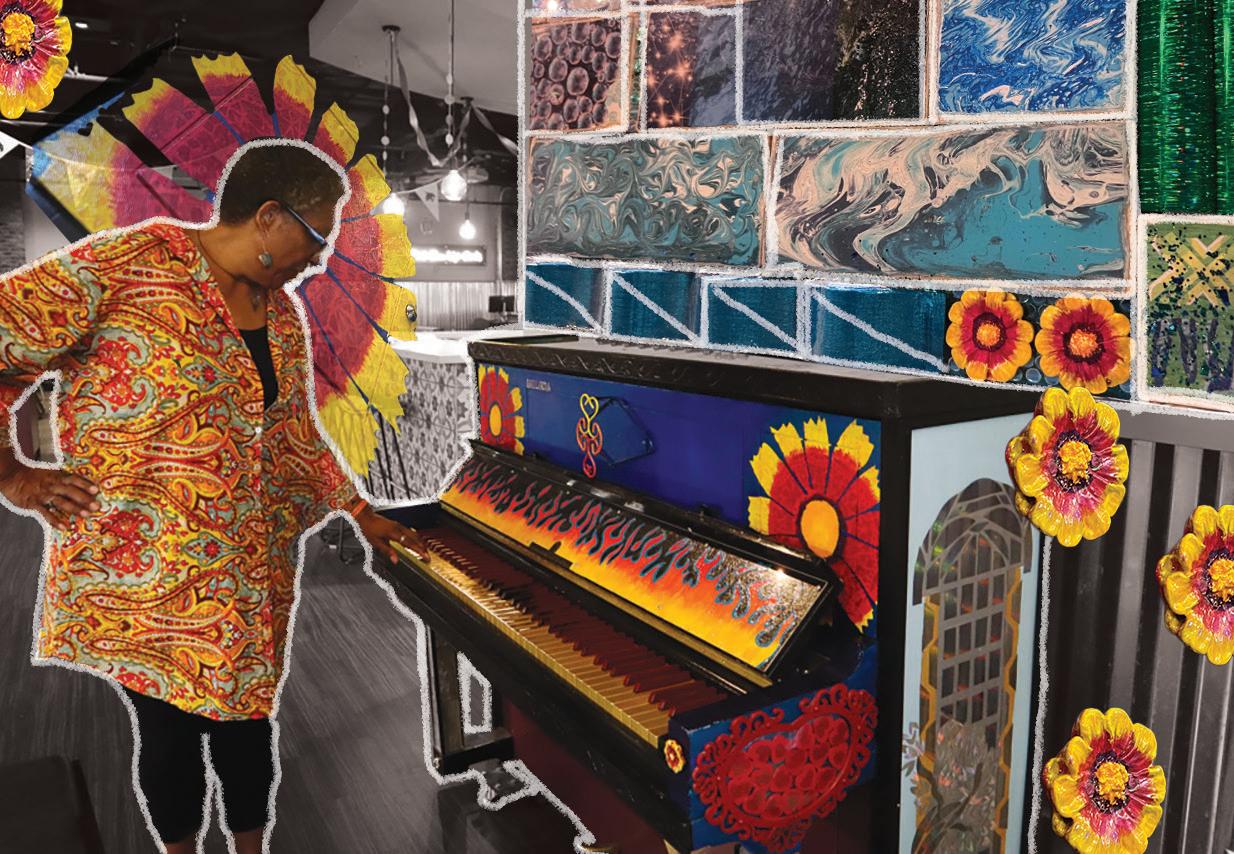
By Chloe Rawlinson Life and Arts Reporter
With every piece of mosaic tile and every stroke of a paintbrush, a Texas State alumna adds a unique perspective to art around campus.
Glynis Christine, interdisciplinary studies alumna, has several pieces of her art displayed throughout Texas State, including a mosaic
By Candace Taggart News Reporter
The first phase of construction to reinstate quiet zones at train crossings in San Marcos was completed on Oct. 29, with the remaining work scheduled for completion by March 2025.
According to the Federal Railroad Administration (FRA), cities or counties can establish quiet zones, where trains are not allowed to sound their horns if the crossings follow specific safety regulations. However, since June, residents are hearing
the train horns in San Marcos for the first time since 2015, when the quiet zones were first instated.
Union Pacific and the FRA inspected San Marcos train crossings in June and found they no longer met the safety rules needed for quiet zones.
“I’ve been working hard to expedite all the permits to go through the approval process, and I’m hoping there’s no comments,” Senior Engineer for San Marcos Rey Garcia said.
The first phase of repairs, which involved fixing missing or damaged signs and striping, began on Oct. 21 and was completed by Oct. 29 at all 18 quiet zone crossings.
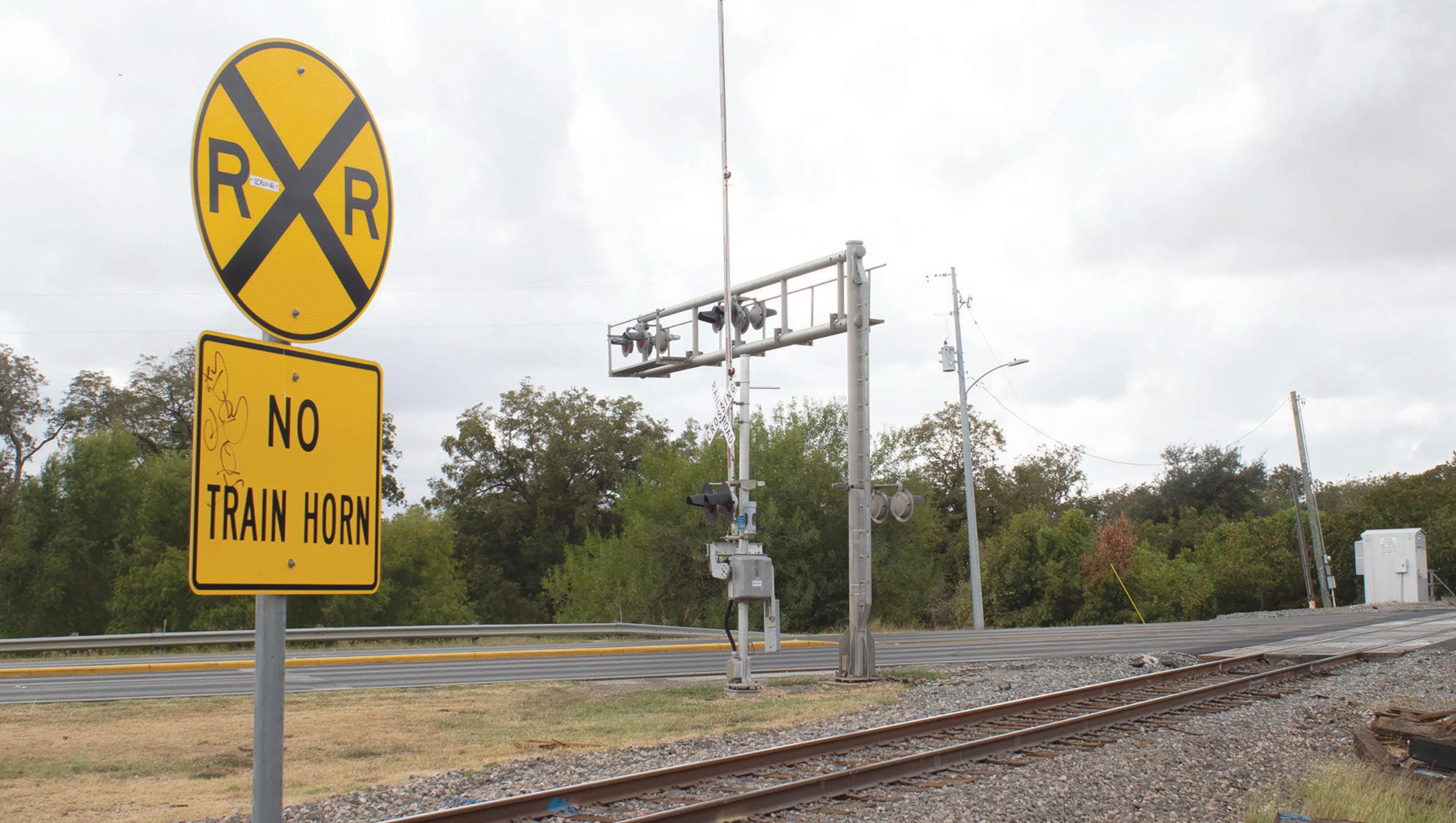
The city of San Marcos applied for a Public Improvement Permit that will allow the city to begin the remaining construction required to reinstate the quiet zones. Garcia said the permit application will be reviewed by Union Pacific soon.
“If they’re approved, then more than likely we’ll be looking at the next couple of weeks [to start construction],” Garcia said. “If they have comments, it’ll be three to four weeks away. Hopefully, by the end of November, we’ll be permitted, and we can start [construction] in early December.”
SEE TRANSPORTATION PAGE 2
in Old Main and a functional painted piano in George’s.
Christine started her journey at Texas State as a nontraditional student at 39 years old. With years of advertising experience under her belt, she earned her bachelor’s in 2000, master’s in 2002 and later worked as a counselor in the LBJ Student Center. In 2017, she discovered an opportunity to create a mosaic for the university through her job.
SEE ART PAGE 7

By Daven Meredith Sports Reporter
Texas State football currently sits with a 4-4 overall record and 2-2 in conference play after being favored to win the Sun Belt West.
In July, the Sun Belt league office announced the Bobcats as favorites to win the Sun Belt West division title. Flash forward to November, and the Bobcats are currently third to last in the West division at 2–2 behind South Alabama, suffering crucial conference losses to the Old Dominion Monarchs 24-14 and the Louisiana Ragin’ Cajuns 23-17, respectively.
After falling to Louisiana-Lafayette, Texas State Head Coach G.J. Kinne said bouncing back after the tough losses throughout the season.

San Marcos has 19 train crossings, 18 of which previously had quiet zones and are now being repaired. The June inspection took place because the city plans to establish a new quiet zone for the Uhland Road crossing, which was never previously a quiet zone.
“We’re trying to minimize the amount of time the trains are sounding their horns,” Garcia said. “[The projects being separate] is the fastest way to reinstate the quiet zone.”
According to the press release, San Marcos aims to request quiet zone reinstatement by March 2025, with Union Pacific approval expected a few weeks later, according to Garcia.
Garcia said the next phase of construction will take six to eight weeks and consist of median and curb concrete replacement for six crossings: McCarty Lane, Centerpoint Road, Posey Road and three crossings on Hopkins Street.
Michael Paxton has lived on Haynes Street between East Hopkins and Rio Vista Street, where two rail lines meet, for four years. According to Paxton, the two tracks are 35 and 80 feet away from his house, and the horns are unbearable.
“The worst part is that you don’t have any warning if you know the train is coming, so you can put in hearing protection or go inside,” Paxton said. “When I’m working in the yard and then I [can see] as the engineer hits the horn and it feels like my ears are going to bleed.”
Paxton said San Marcos’ communication outreach has not been successful as he wasn’t aware of the removal of the quiet zones.
Maddie Baker, communications specialist for the city of San Marcos, said the initial outreach after the removal of the quiet zones was as efficient and extensive as possible.
“The press release was sent out the weekend before the train horns were sounding and we had several media outlets reach out to us to cover it,” Baker said.
Nate Rosales has lived in San Marcos for 10 years. He currently lives between Wells Fargo and Railyard Bar and Grill, near the LBJ crossing.
Rosales said living with train horns is more irritating now because he usually works from home.
“There’s nothing really to do about the noise, except wait,” Rosales said. “If I’m in a meeting, I just have to stop and mute myself. It also impedes my sleep and wakes my dogs up.”

MAP BY TANNER BROWN
According to a press release from the city of San Marcos, the city will be implementing a new curb design standard and Garcia said all the crossings will be inspected every two to three years.
“Hopefully with this upcoming election, it can be ensured that the city needs to stay on top of things and make sure that these things are being taken care of,” Rosales said. “I love this city, and I want to continue to see it taken care of, and it doesn’t feel like that happens often.”
By James Phillips News Reporter
San Marcos returned to Stage 3 drought restrictions for the first time since July 2023.
San Marcos entered Stage 3 drought restrictions on Oct. 27 after the water level of the Edwards Aquifer fell below 640 feet above sea level.
The San Marcos River’s flow also decreased to 90 cubic feet per second, nearly half its regular flow rate of 165 cubic feet per second, according to a report by the United States Geological Service (USGS).
Jan De La Cruz, conservation coordinator for SMTX Utilities, said above-average water use combined with low rainfall has worsened the drought.
“[San Marcos’ water] usage is higher than normal this time of year and the weather predictions are not looking good as far as getting badly needed rainfall,” De La Cruz said. “[San Marcos has] been in a drought for a few years now, and we just haven’t had enough rainfall to fill up our water sources.”
As of Oct. 27, the use of hose-end sprinklers is limited to one day every other week, based on the

Editor-in-Chief: Marisa Nuñez stareditor@txstate.edu
News Editor: Lucciana Choueiry starnews@txstate.edu
Sports Editor: David Cuevas starsports@txstate.edu
PIR Director: Carlota Pulgar starpr@txstate.edu

Director: Laura Krantz laurakrantz@txstate.edu
designated weekday tied to an individual’s address. Sprinkler irrigation is permitted only before 10 a.m. or after 8 p.m. on the assigned day, with watering ending by 8 a.m. the following morning. Soaker hoses and drip irrigation systems are allowed once a week, also based on the designated day and time, according to the city press release.
Hand-watering with a bucket or hose is permitted any day before 10 a.m. or after 8 p.m. Additionally, filling new decorative water features remains prohibited, and at-home car washing and foundation watering are restricted to one day per week.
According to De La Cruz, it is un-likely San Marcos will alter its current drought stage anytime soon, but that depends on weather conditions.
“The danger is that if we don’t get additional rainfall over these winter months, and don’t have decent spring flows and river levels next summer - then certainly that could also have a negative impact on the tourism industry,” De La Cruz said.
Robert Mace, executive director of the Meadows Center, said while the majority of river species are not currently under threat due to the work of San Marcos conservation groups, there are still long-term detrimental environmental effects from the drought.
“The footprint of the river has shrunk due to the low flows... we’ve lost habitat for Texas Wild Rice where the rice used to grow,” Mace said. “The other aspect is that as the river gets shallower recreational activities become harsher on the environment.”
The restrictions are in place to reduce the severity of the drought in the San Marcos area, De La Cruz said.
Scan the QR code to read the rest of the story.


Managing Editor: Blake Leschber starmanagingeditor@txstate.edu
Life & Arts Editor: Carlene Ottah starlifeandarts@txstate.edu
Multimedia Editor: Kobe Arriaga starmultimedia@txstate.edu
Digital Products Developer: Sri Naga Sri Govvala starweb@txstate.edu
Design Editor: Sarah Manning stardesign@txstate.edu
Opinions Editor: Rhian Davis staropinion@txstate.edu
Engagement Editor: Diego Medel starengagement@txstate.edu
Creative Service Director: Jen Nguyen starcreative@txstate.edu
Copyright: Copyright Tuesday, November 5, 2024. All copy, photographs and graphics appearing in The University Star are the exclusive property of The University Star and may not be reproduced without the expressed written consent of the editor-in-chief.
Deadlines:

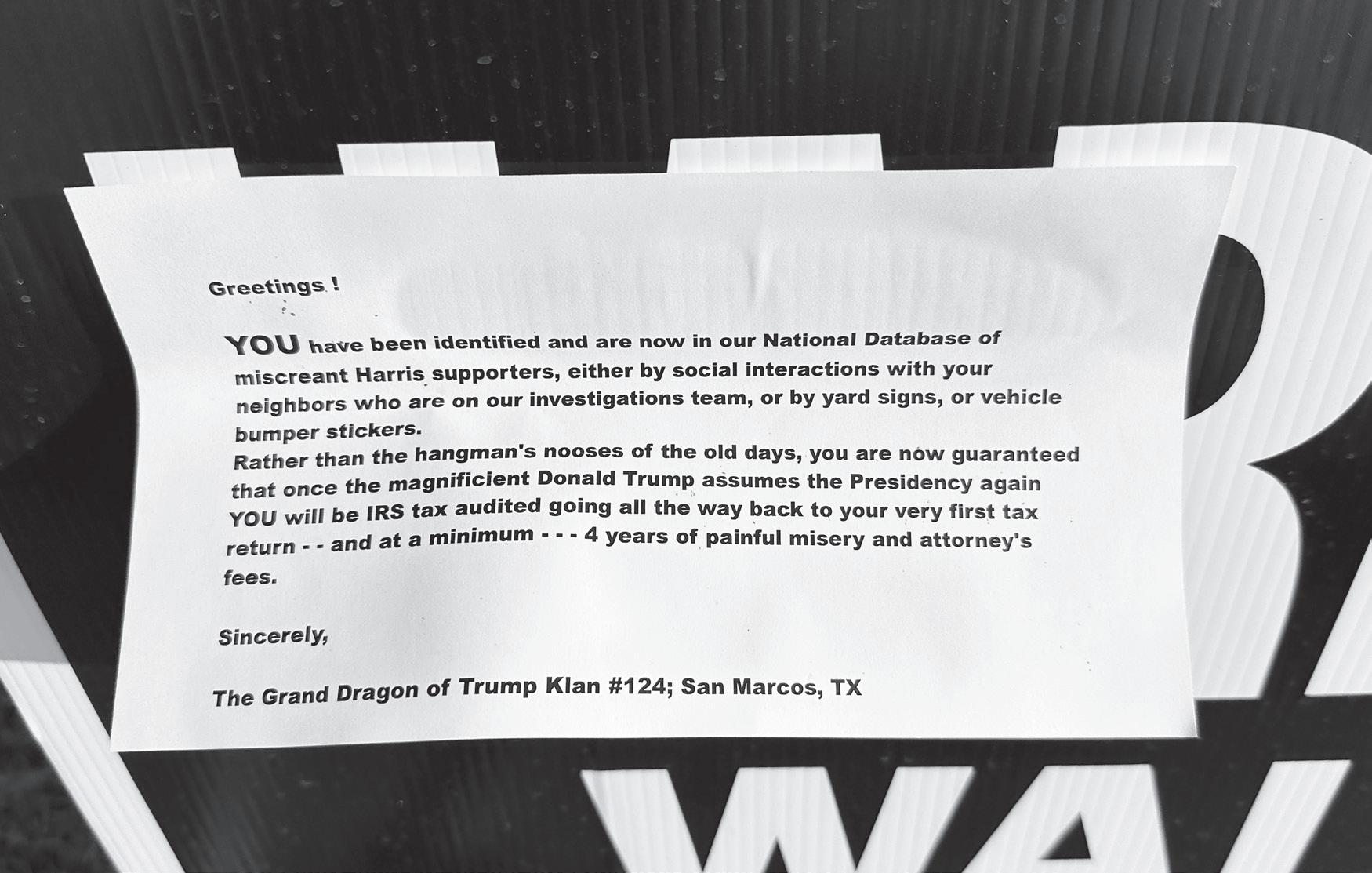
The flyers were signed by “The Grand Dragon of Trump Klan #124; San Marcos, TX.”
According to the Bullock Museum, a Grand Dragon is the highest ranking Ku Klux Klan (KKK) member in Texas. It is currently unconfirmed if the flyers are connected to the KKK.
Though it is unconfirmed if it was a group who put out the flyers, or just an individual, San Marcos Mayor Jane Hughson said the behavior is concerning.
“Even if it’s a lone wolf, it scares me that there’s someone out there with that mindset,”
Hughson said. A San Marcos resident, granted anonymity for safety reasons, said a letter was left on their Harris/Walz sign when they were not home. They first learned about the letter from neighbors on Friday, Oct. 25.
“I first thought it was a joke, and then I thought, ‘No, this is voter intimidation. This is not a joke.’ And if somebody thinks it’s a joke, they’re totally mistaken about that,” the resident said.
The resident said they initially contacted SMPD, who came the next day to
Neidhardt’s email came after an Oct. 7 email to faculty and staff from Nelly Herrera, vice chancellor and general counsel of the Texas State University System, reminding them of the Texas Government Code on elections. The code states “a state officer or employee may not use official authority or influence or permit the use of a program administered by the state agency of which the person is an officer or employee to interfere with or affect the result of an election or nomination of a candidate or to achieve any other political purpose.”
After discovering the violation, Alicia hired attorney Chevo Pastrano to write a letter to Texas State President Kelly Damphousse detailing the situation and asking for action against Neidhardt. The requested actions included terminating Neidhardt’s privileges as an adjunct professor, suspending his Texas State University System email accounts and IT access and implementing remedial measures to address the impact of the violation. Pastrano also suggested the university send a mass email to students, faculty and staff, informing them of Neidhardt’s termination and the suspension of his privileges.
Pastrano also filed a criminal complaint against Neidhardt with the Texas State University Police Department and the Hays County Criminal District Attorney’s Office.
“We have received a formal complaint regarding this matter. It would be inappropriate to comment at this time,” Gregg Cox, first assistant district attorney wrote in a statement to The Star.
Neidhardt confirmed Texas State placed him on administrative leave following Pastrano’s letter. It is unclear if any other action has been taken against Neidhardt.
“I was put on leave last night, 10/26, less than 24 [hours] after my opponent asked the university to reverse their ‘final’ decision,” Neidhardt wrote in a statement to The Star.
According to Neidhardt’s statement, the university originally told him he could continue to teach students as long as he did not send out anymore emails. Neidhardt said he complied with Texas State’s requirements, but was placed on leave anyway.
According to Pastrano, neither he nor Alicia will ask Texas State to take further action against Neidhardt.
collect the letter as evidence. They also spoke with an FBI agent about the incident, but it is unclear if this is being treated as a voter intimidation case. Under 18 U.S.C. 594, voter intimidation is a federal crime which can be punished with a fine and up to one year in jail.
The resident said there was no unusual behavior in the neighborhood leading up to the incident.
“[There was] no activity at all,” the resident said. “I mean, there are other [Harris/ Walz] signs that are up, so the fact that they chose mine is
“We think that the university is taking the appropriate steps in order to prevent further violations of law, which was our main concern,” Pastrano said.
Neidhardt had been teaching the Courts and Criminal Procedure class (CJ 2350) this semester, but Monday, Oct. 28, marked his final day as the professor of the course. Jeff Bumgarner took over as the professor for Neidhardt’s CJ 2350 class.
Emma Oertling, criminal justice junior, said Neidhardt announced to the class that Monday, Oct. 28, would be his last day of teaching.
“He came in and just kind of was like, ‘Hey, this is going to be my last class with you guys. I’m so sorry about it. I just found out not that long ago,’ and then we didn’t talk about it because we had a guest speaker… but he did say it was because of an email he sent,” Oertling said.
Some of Neidhardt’s students have spoken out about him being placed on leave.
“I understand there may have been a violation of Texas State University rules concerning the use of a university email address,” Salena Vare, a criminal justice junior, wrote. “Nonetheless, the level of action taken against Professor Neidhardt is unjust.”
According to Vare, Neidhardt made it clear he would not give preferential treatment to students based on who they voted for, or any campaigns they worked for.
For Jason Arellano, business agriculture senior who was also in CJ 2350, Neidhardt was one of his favorite professors in college.
“I didn’t actually know he was up for reelection, he never brought it up [in class],” Arellano said. “... But now it’s sad because it feels like the university is pushing him out the door.”
It is unclear if Neidhardt’s status as an adjunct professor will be reinstated. It is also unclear if Neidhardt will face any criminal charges.
This is a developing story. The University Star will provide updates as they become available.

I want to be very clear, everybody needs to remember that your vote is secret. So all these threats of ‘we’re watching you,’ and any of that kind of stuff, they don’t know how you vote,”
John
Hatch Chairman
for the Hays County Democratic Party
sort of random, right?”
Chairman for the Hays County Democratic Party
John Hatch said he received multiple reports of similar incidents.
“We’ve actually had one report of a local Democrat who had a sign in their yard, and a person actually knocked on their door and basically gave them the same verbal warning that was on the letter,” Hatch said.
Hatch said he doesn’t believe voters should be intimidated by the messages left on their political signs, or change their voting behavior because of it.
“I want to be very clear, everybody needs to remember that your vote is secret. So all these threats of ‘we’re watching you,’ and any of that kind of stuff, they don’t know how you vote,” Hatch said.
The Hays County Republican Party did not respond to a request for comment.
According to David Levy, a political science assistant
professor of instruction, the claims made in the letter are likely baseless.
“I don’t believe that it’s possible or legal for that to have been a true statement, but who knows what’s in the mind of the person to convey this information?” Levy said.
Before becoming a faculty member, Levy worked as the Archer County attorney and served as an elected mayor for Archer City. He said that in all his time in civil service, he had never seen an incident like this.
“I have seen misinformation in political campaigns, but that’s a different issue that’s attempting to discredit the candidate versus threatening the well-being of an individual voter,” Levy said.
The Hays County Elections Office did not respond to a request for comment.


guides.vote for
ABORTION
Ban or legal?


Legal. Would work “to protect the freedoms and rights of women.” Calls Texas’s abortion ban “cruel.” Sponsored bills to enshrine federal rights to abortion and out-of-state services.
Ban. Supreme Court reversing Roe v. Wade is “a massive victory for life.”
Opposed putting the right to abortion into federal law. In 2016 said there should be no exceptions for rape or incest. Sponsored a bill criminalizing performing abortions after 20 weeks.

HEALTHCARE
Increase or decrease government support for healthcare? Support or oppose Obamacare?
Increase. Supported lowering drug prices for Medicare beneficiaries. Sponsored a bill directing $442 million to upgrade veterans’ healthcare facilities in Texas. Supports Obamacare, and in 2019 condemned repeal attempt.
IMMIGRATION
How to handle immigration? Support a path to citizenship for “DACA” participants brought to the US as children?
LABOR
Make it easier or harder for unions to organize?
Supports a federal, bipartisan policy that “secures the border” and “modernizes our asylum system.” Supports Biden’s expanded border wall. Denounced openborders policies. Sponsored a bill to secure the border and grant a phased pathway to legal status. “Border security does not mean being brutal.” Would protect DACA.
Easier. “It’s critical that we protect the right to organize.” Supported the PRO Act providing protections for workers trying to organize. Is endorsed by the Texas AFLCIO.
Decrease. People should “manage their own healthcare, not the bureaucracy.” Opposed a bill reducing drug prices. Would “revisit” the effort to replace Obamacare.
Supports a wall, harsher asylum and visa standards, more border patrol agents. Calls Biden’s expanded border wall “window dressing.” Sponsored a bill to end benefits and increase fines and fees on migrants and build a wall. Sponsored a bill letting local law enforcement cooperate with DHS. Opposes DACA: “Obama’s executive amnesty was illegal.”
Mixed. Opposed USDA’s partnering with a farmworkers’ union in an agricultural pilot program. Supported increasing rail union workers’ number of paid sick days.
CLIMATE CHANGE
Should climate change be a top priority?
CRIMINAL JUSTICE
How to ensure effectiveness and fairness in law enforcement?
Yes. Is “incredibly concerned” about climate. Supports being “aggressive” about emission reductions while being “realistic” and innovative. Natural gas is “important,” but “we can find… reductions” and increase carbon capture.
Supports “common-sense reforms that will restore trust in our law enforcement and ensure justice.” Voted for holding police accountable, addressing racial profiling, and limiting use of force. Sponsored a bill to encourage police use of “de-escalation tools.”
ECONOMY
How to improve the economy and make daily life more affordable.
ELECTIONS
Did Joe Biden win the 2020 Presidential election?
Increase. Voted for a bipartisan bill to provide funding for infrastructure.
No. Voted against funding $369 billion in climate and clean energy initiatives. Pushed for Trump to pull out of the Paris pact to reduce global warming. A tax on methane emissions represents a “radical climate agenda.”
Police are “under attack.” Sponsored bills strengthening protections for police and having recruits work in their own communities. Said January 6 U.S. Capitol stormers were prosecuted more than Black Lives Matter protesters he called “terrorists.”
Decrease. Voted against the bipartisan infrastructure bill, calling it “reckless.”
LGBTQ RIGHTS
Limit or expand LGBTQ rights?
Expand. “LGBTQ+ Texans deserve a Senator who will listen to and fight for them.” Sponsored two bills guaranteeing federal civil rights protections for LGBTQ+ Americans and same-sex couples.
Limit. Opposed a ban on discrimination against LGBTQ+ people. Opposed federal protection of same-sex marriage: each state should decide. Sponsored a bill banning trans athletes in women’s sports.
MARIJUANA Ban or legal?
Legal. Praised Biden’s pardoning of federal offenses of marijuana possession. Voted to streamline research on marijuana and to decriminalize it nationally.
No recent position found. In 2018: “Different states can resolve it differently. So in Texas…I would vote against legalizing it,” but Texans should “make that decision.”
MINIMUM WAGE
Raise federal minimum from $7.25 an hour? Yes. “I’m running for Senate to fight for $15/hr.” In 2019 voted to raise the federal minimum wage to $15 per hour.
No. Opposed raising the minimum wage to $15 an hour. Wage increases mean that people lose jobs; “the most vulnerable” are hurt.
STUDENT FINANCIAL AID
Yes. In November 2020, said “After voting in record numbers, Americans have chosen Joe Biden as their President.”
No. In 2021 rejected Electoral College results from some states; called for a commission to audit results. Voted against impeaching Trump for inciting insurrection.
Support lowering interest on student loans and/or forgiving them?
TAXES
Raise or lower taxes on the wealthy and corporations?
Yes. Supports reducing and forgiving loans. “Too many Texans are burdened by student loan debt.” Supports Biden’s SAVE plan to cut monthly repayments.
No. “Biden’s decision to ‘cancel’ student loan debt is illegal.” People getting loans canceled are “slacker baristas.” Voted to repeal loan payment suspension.
More. Voted to require a 15% corporate minimum tax. Criticized the 2017 Trump tax bill for prioritizing “tax cuts to billionaires and corporations.” Supports a bill “to expand and extend the Child Tax Credit.”
Less. Voted against requiring a 15% corporate minimum tax. Supported the 2017 Trump tax bill with the largest corporate tax cut in US history. “We should stop the weaponization of the tax code, abolish the IRS, and start over.”
ENVIRONMENT
Loosen or tighten environmental regulations?
Tighten. Voted for fund to plug orphaned oil and gas wells and to track greenhouse gases. Voted to keep aid to low-income areas for reduction of greenhouse gas emissions and to keep a tax on methane emissions.
Loosen. Opposed EPA’s air quality regulations. Opposed a NASA rule requiring contractors to disclose greenhouse gas emissions. Sponsored a bill to repeal an EPA limit on vehicle emissions.
VOTING RULES
Make voting harder or easier?
Easier. Supports “making it easier” to vote. Opposes restricting “access to polling places.” Supports voting by mail and early voting. Voted to expand registration and voting access, and make states get federal preclearance for voting law changes.
Harder. Opposed banning states from restricting voting access, saying it “strikes down virtually every voter integrity law” and allows “ballot harvesting.” Would require citizenship proof for mail-in voter registration. Opposed expanding voting access.
GUN LAWS
Loosen or tighten gun regulations?
Tighten. Supports “common-sense” laws to “reduce gun violence and save lives.” Voted to implement “red flag” laws, raise the legal age to buy some rifles, & expand background checks. Sponsored an assault weapons ban.
Loosen. Opposed bipartisan gun safety bill, with expanded background checks; it would “keep guns from law-abiding owners.” Wants “more police officers” in schools. The Second Amendment “shall not be infringed.”


Opinions in The University Star are not necessarily those of our entire publication, Texas State University’s administration, Board of Regents, School of Journalism and Mass Communication or Student Publications Board.
By Nikita Arefiev Opinions Columnist
The Dunbar neighborhood in San Marcos, historically an African American community, is endangered by the social phenomenon of gentrification.
The neighborhood was initially established due to segregation policies and African American San Marcos residents were forced into this part of town due to discriminatory housing practices in the Jim Crow era. The neighborhood has since evolved into a prominent cultural center, but it is now under threat of dissipation.
As Texas State’s enrollment seems to grow without end and students seek affordable housing near campus, they are moving into traditionally redlined areas, including Dunbar, where housing prices have historically been lower due to systemic disinvestment.
As students flood the market, demand for housing in Dunbar rises, driving up property values and rent prices. This displaces long-time residents who can no longer afford to live in their own neighborhood and allows more students to move in, creating a “snowball effect.”
Data from The End of Austin, an award-winning digital humanities project that explores urban identity in central Texas, tells a dark story. In the 1950s, African Americans made up roughly 50% of San Marcos’ population. Today, that figure stands at just 5.5%, reflecting decades of economic pressures pushing the community out of the city.
The Dunbar neighborhood is a unique microcosm of this trend. Most of the original residents moved out

in the 80s and 90s, due to housing pressure, availability of better options elsewhere or both.
Now, the main objective is to preserve existing cultural landmarks and prevent the second wave of gentrification from permanently erasing historic and cultural locations. Establishments, such as Ms. Ollie’s Store, that once served as hubs for the African American community are now closing, being repurposed or losing their cultural significance as new, unrelated businesses and residents replace them.
Gentrification fundamentally changes the character of the neighborhood as properties are remodeled to appeal to a different demographic; one with the financial means to afford higher rent prices. What was once a vibrant, close-knit community is now at risk of becoming another student housing neighborhood, devoid of its unique historical and cultural significance.
Addressing these concerns requires deliberate action by the San Marcos City Council. Affordable housing initiatives, rent control measures or
zoning policies that protect longstanding residents from being priced out could help preserve Dunbar’s cultural heritage.
Texas State also has a major role to play: the university must take steps to ensure students understand the impact their housing choices have on local communities and support policies which mitigate displacement. Students intending to live in the area must realize the broader cultural context within which they situate themselves.
Dr. Eric Sarmiento, assistant professor of geography, has done research on gentrification in Dunbar that included a door-to-door census of the neighborhood in 2020.
“[Students] have a big impact on politics of the city,” Sarmiento said. “There’s a lot of things students can do to be involved and try to be conscious residents... If you’re here for four years or you’re here for the rest of your life, I think there’s ways to be a good member of the community. The Calaboose Museum is a great place to start.”
The Calaboose Museum is a crux of resistance of the local community in their efforts to honor the neighborhood’s cultural heritage through preservation, events and education.
The story of Dunbar is not just one of a neighborhood at risk — it is also a call to action. If San Marcos does not act to protect the remaining historical community, it risks losing a vital piece of the city’s cultural identity forever.
- Nikita Arefiev is an international relations sophomore
By Olivia Corbin Opinions Contributor
Since the COVID-19 pandemic, students and teachers have become more reliant on personal devices. However, with access to technology 24/7, it’s reasonable to question if online learning leads to information going through one ear and out the other.
According to the University of Florida’s Institute of Higher Education, 52% of Americans believe online programs are equally as valuable as their on-campus counterparts. However, “students enrolled in online courses complete degrees at a lower rate.”
Although online degree programs make education more accessible, the benefits to in-person learning far outweigh online learning. Online degree programs often don’t allow students to properly learn material, so they enter the workforce unprepared. In addition, learning online makes networking and social connections nearly impossible.
Universities around the country have different opinions regarding online learning. Some encourage online programs, while others, like the University of California, outlaw it. Texas State seems to think online
programs are beneficial, as “18 new workforce-relevant programs” will be available in 2025.
Online learning makes cheating extremely easy, meaning many students are not actually learning.
According to a survey from The Hechinger Report, 93% of instructors believe students are more likely to cheat online rather than in person.
After graduating, students are not prepared to use their degrees in their careers and often have less success than students who graduate with a traditional degree.
According to Barbara Knowlton, a psychology professor at the University of California, Los Angeles, online degree programs are considered “second-class” to employers looking to hire college graduates.
Furthermore, college students need to excel in their courses to find a good job or keep their academic scholarships.
Rebecca Burch, a health science freshman, said from her experience, online courses don’t provide the same well rounded experience that in-person courses do. She also said having her assignments online lead to her not learning anything.
“Having a professor explain it faceto-face makes it easier to comprehend the information and ask questions,”
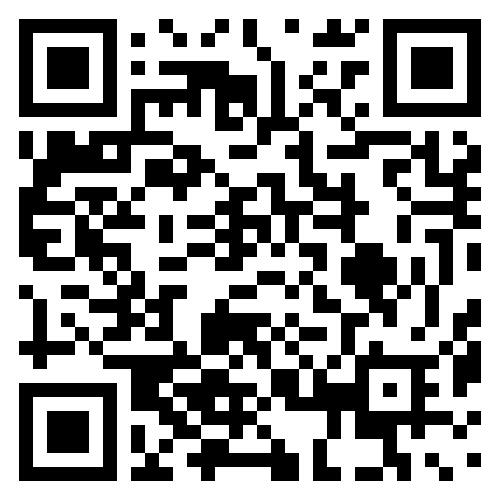
Burch said. “You’re able to interact with classmates in person and you can’t have the study groups or beneficial social interactions online.”
Finally, one of the most beneficial take aways from attending in-person classes is the connections one makes. Taking classes with students pursuing the same degree offers opportunities such as lifelong friendships and career connections.
Online programs make it difficult to create strong and lasting relationships. As seen during quarantine, being restricted online makes personal connections harder to find and sustain, which can take a toll on mental health. According to the Clearfork Academy, online courses can lead to isolation which “can impact [students’] mental health and lead to problems such as depression or anxiety.”

grows and evolves, it’s important to remember how important human connection is.
- Olivia Corbin is a mass communications freshman
While online courses can help people who are not able to attend in person classes, in-person classes are imperative to success. As technology
The University Star welcomes Letters to the Editor from its readers. All submissions are reviewed and considered by the Editor in Chief and Opinions Editor for publication. Not all letters are guaranteed for publication.

“There was a woman [who worked with me at the Student Center], and she mentioned that she was having fun buying things because [the Student Center] was redecorating George’s, and I had just gotten mosaic tiles from a friend of mine,” Christine said. “I said, ‘Oh, you ought to let me do a piece of art for you,’ and she said yes.”
The mosaic piece, “Home Away From Home,” was originally hung in the Student Center in 2018 before the College of Fine Arts bought it and moved the piece to Old Main, the subject of the mosaic. Christine felt inspired by her impactful experience at Texas State, choosing to capture the essence of one of the campus’ most recognizable buildings.
“[Texas State] was a place where I found out how much I was capable of,” Christine said. “That was really important, espcially that late in life, to find out what I could do, so [the mosaic] was my way of saying thank you.”
Kelly Kaufhold, associate professor, was on Texas State’s staff when Christine’s mosaic was moved to Old Main.
“I always thought [the mosaic] was amazing,” Kaufhold said. “It’s just such a beautiful representation of Old Main. I liked it so much when I kept seeing it, that I looked it up to know more about it. I always loved seeing it there, and I was even more excited to learn
that it came from [a Texas State alumna].”
After creating the mosaic for the Student Center, Christine received the opportunity to renew a worn piano in George’s from her supervisor at the Student Center.
The piano reminded her of one used at a Texas State music recital.
“There was a piano instructor, she did a recital one night and it was like nothing I had ever seen,” Christine said. “So, when I saw the piano [at George’s], I [knew I wanted to decorate it].”
The recital continued to inspire Christine throughout the painting process, along with her pride in her alma mater. She finished the piano, “Gallardia,” in 2020.
“I wanted to put flames coming off of the keyboard, because that was the impression I got of watching her play,” Christine said. “I wanted the white keys to be gold, and then later I realized I had to make the black keys maroon for our school colors. The idea is to play [the piano] and enjoy the art.”
While the pieces of art represent Christine’s unique experience as a student, they also represent her identity as a Black woman.
“I want people to know that a Black woman did this,” Christine said. “I think that minorities on campus may feel like they aren’t being seen or heard sometimes, and I want them to know that the university really does support not just the arts, but minori-
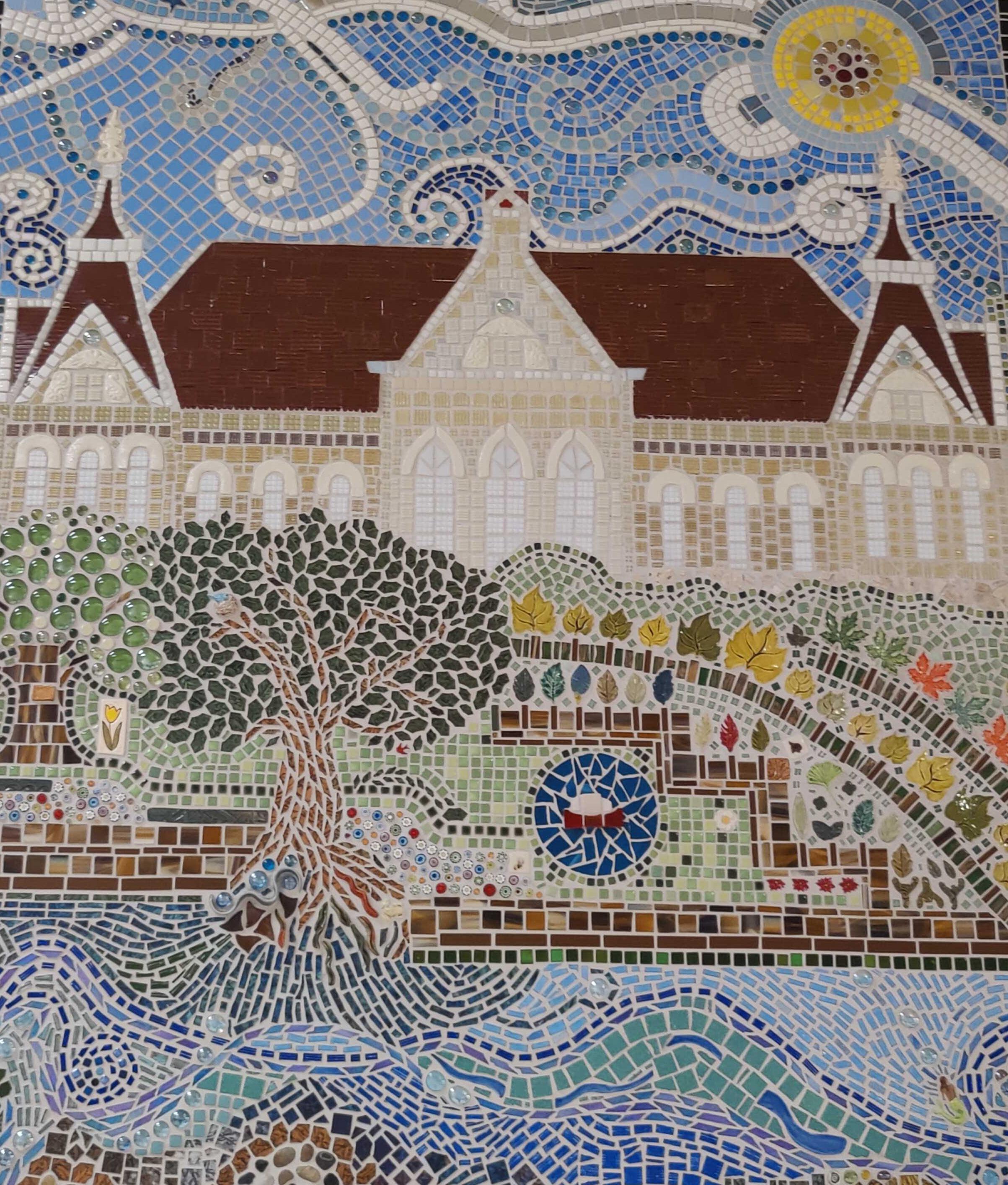
crafted the mosaic and supported her through her artistic process.
“Glynis is a woman, she is a person and she is a black person,” Parrish said. “She is drawing from her own expe-

riences, which are similar to everybody’s. She’s shown that she can [defy] stereotypes and do a very sophisticated, very complicated art process.”


THURSDAY, NOVEMBER 14
Join TXST for a free spirit rally featuring headliner Josh Abbott Band with special guest Grupo Fantasma and fireworks, a drone show, and family activities.

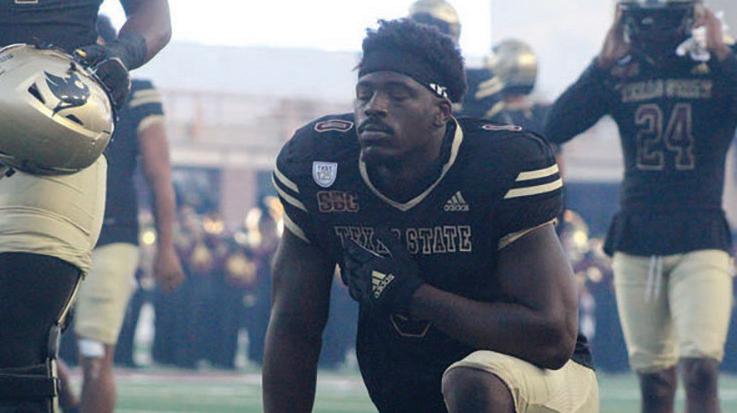
“We’ve had some tough losses this year. We haven’t felt like we can catch a break,” Kinne said. “The only way you can change that is to go to work, and I know our guys will do that.”
The Bobcats are behind the eight-ball for a chance at the Sun Belt West title and the conference championship and do not control their own destiny. They will have four remaining games to crawl back into the race and will need help from opponents.
“It’s disappointing. Wherever you are picked preseason, that’s what you work for,” Kinne said. “We break it out to champions every day, but now, we don’t control that anymore.”
Texas State jumped out to a 2-0 conference start with wins against Troy and Arkansas State, the first 2-0 Sun Belt start in program history. However, the success was answered with back-to-back losses, with the Bobcats dropping four of their last six games.
Kinne holds a 6-6 conference record dating back to 2023. The former NFL quarterback’s first season as head coach saw the Bobcats’ first-ever bowl win, defeating the Rice Owls 45-21 in the SERVPRO First Responders Bowl, setting up high expectations for the 2024 season.
Expectations heightened after bringing in reigning Sun Belt Conference Player of the Year, senior quar-
terback Jordan McCloud, who went down with an apparent injury and did not return after the first half against Louisiana-Lafayette last Tuesday.
McCloud joined a backfield with the 2023 leader in all-purpose yards, junior running back Ismail Mahdi. Senior wide receiver Joey Hobert returned with several familiar and new faces to round out a dynamic offense for offensive coordinator Mac Leftwich.
Texas State currently ranks second in the Sun Belt in total offense but ranks ninth out of fourteen teams in red zone scoring. The Bobcats are 21-27 in red zone scores and 17-27 in red zone touchdowns while converting just 4/7 field goals this season.
On the defensive side of the ball, the Bobcats lead the Sun Belt in sacks but have been without senior defensive end Ben Bell in the past two conference losses. Bell’s 10 sacks lead the team in 2023.
The Cedar Park native recorded 3.5 sacks in four games played in 2024 and was inactive in the Cats’ two losses where the defense gave up 5.2 yards a rush to Sam Houston and Old Dominion. Both opposing quarterbacks, Bearkats junior Hunter Watson and Monarchs freshman Colton Joseph, eclipsed over 100 rushing yards.
Though redshirt senior defensive end Steven

By Adrian Ramirez Sports Reporter
In today’s NCAA, which is filled with NIL deals and transfer athletes, loyalty is rare. That is precisely what makes Texas State volleyball fifth-year setter Ryann Torres an uncommon player in collegiate athletics.
Torres has spent all five years at Texas State, embracing the ups and downs of collegiate athletics by looking at the positives and holding memories close.
As a fifth-year player on a young roster, Torres knows it is now her turn to become the leader of the team. She said she began to feel the pressure of
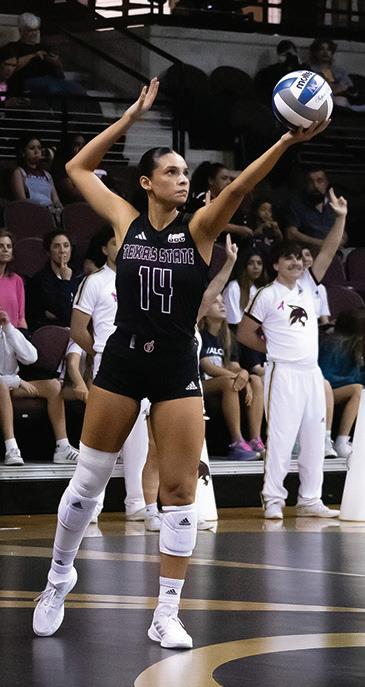
Parker has emerged as the Bobcats’ sack leader with five sacks through eight games in 2024, opponents have one less playmaker to game plan for, allowing opposing offenses more opportunities to open up run and pass lanes.
With four conference games remaining in 2024, the Bobcats must win two of four to attend a bowl game for the second straight year, which would be the first time in program history.
“We still got a lot to play for; we have to get bowl eligible, so we have to get out there and work,” Kinne said. “We’ll be on the road again versus a really good team, so we have to get back to work.”
The Bobcats look to bounce back on the road next week, taking on the University of Louisiana-Monroe.
Kickoff between Texas State and Louisiana-Monroe is scheduled for 11:30 a.m. Saturday, Nov. 9, at Malone Stadium in Monroe, Louisiana. The game will be available to watch on ESPNU.
stepping into that role during her senior year and she has come a long way in terms of being a leader on the court.
“Just being relatable is what I’m really good at in my leadership,” Torres said. “I’m just there for [the team] when things are hard or out of sorts.”
Along with emerging as a leader, Torres also stepped up on the court in a big way for the Bobcats. As a senior, Torres was named Second Team All-Conference setter and is currently outperforming her senior year stats.
Torres currently leads the Sun Belt with 10.36 assists per set, and according to Texas State Head Coach Sean Huiet, she has a great shot at winning the Sun Belt Setter of the Year award.
“Ryann always wants to win; she’s [extremely] competitive,” Huiet said. “I think [Torres] has a really good shot at Setter of The Year…and I think it’s her competitiveness that really makes that tick; she’s willing to do whatever it takes.”
Huiet also said because Torres has been in the program for five years, he can have tough conversations with her or use her as an outlet to relay messages to the team.
“I’ve been a head coach for five years and she’s been here for five years, so I feel like we have a relationship where she can come in and we can talk about anything,” Huiet said. “I can call her up and ask her what’s going on, tell her something isn’t going to fly or that the team needs to reach a certain level.”
Torres hasn’t always been front and center in her collegiate career, though. As a sophomore in 2021, she played in 91 sets, which is still the most she’s played in one season. But as a junior, her playing time took a dramatic hit, appearing in 38 sets.
Torres said seeing a dip in playing time affected her and she could have easily jumped into the transfer portal like others. Instead, she chose to look at it as a necessary hurdle to becoming the player she is today.
“[Playing less] did mess with me a little bit, but at the end of the day it just built character,” Torres said. “It took me a lot to work through, but I think [my situation] helped me mature a lot.”
With Torres’ final season approaching an end, Huiet said there’s so much more than just her playing abilities that will be missed.
“[Torres] has been the one player who has been with me as a head coach all five years,” Huiet said. “[Torres]
has a great personality, she makes us laugh; there’s so much more to her than just the volleyball side that we’re going to miss.”
As for Torres herself, she said she will always be fond of her time as a Bobcat because it has helped make her who she is today.
“Getting through the hard times has given me confidence; I’ve found who I am as an athlete and I’ve found who I am as an individual,” Torres said.
“Remembering all the big moments that made me feel sad or happy, I’ll just take them with me and cherish them because those are the best memories ever.”
